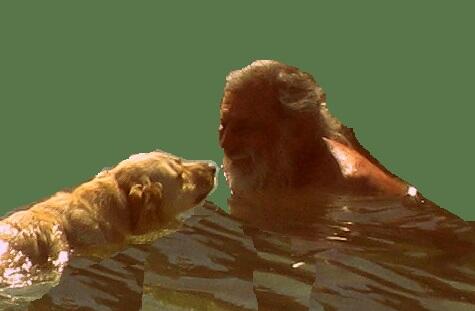Baby and puppy photos are so cute.
I am often guilty of sharing and liking them because I adore baby things – human or otherwise. One cannot help to like or share them, but something was always scratching in the back of my mind. As a retired Paediatric Nurse, I cannot ignore the dangers and discomforts such contact poses to small children and especially to babies. Babies still have immature immune systems. They get much of their immune boost through breastfeeding. I say breastfeeding and not merely breast milk because love is one of the strongest immune boosters. Loving cuddles are especially important for bottle fed babies – but that is not the subject under discussion. In my young days, I worked at the casualty department at Red Cross in Rondebosch. They even had an overflow ward in casualty for babies with gastro and diarrhoea because the ward was full. All of them on drips and many of them died.
When I worked at Addington in Durban intestinal parasite infestation was so common that one British sister went around and gave all the children that were admitted a complimentary dose of worm medication. She meant well, but we had to put a stop to it because some children were just too ill for such oral treatment.
When I later worked at an overseas Paediatric intensive therapy word, I saw some of the worst horrors, that diseases like rabies and dog bites can have on the little bodies of young children, again some died from it.
My advice is to keep babies’ faces away from animals. Kissing them is out. Keep them away from animal poo soil. Teach children (and adults) to wash their hands after they handled animals. Never put a dummy that fell on the floor back into a baby’s mouth without sterilizing it.
Children do develop a resistance to germs in their own homes, but as I mentioned before, small babies have immature immune systems.
The main types of diseases which people can pick up from dogs are rabies, salmonella, campylobacter, giardia, cryptosporidium, roundworm and ringworm.
FROM THE INTERNET
How can you prevent the spread of infectious disease from your pet?
Proper care of your pet may prevent the spread of infection or illness to household members. To prevent the spread of disease from your pet, take the following precautions:
Keep your pet's immunizations current.
See a veterinarian regularly with your pet for health checkups.
Keep your pet's bedding and living area clean.
Feed your pet a balanced diet and avoid having your pet eat raw foods or drink out of the toilet.
Clean cat litter boxes every day. Pregnant women should avoid touching cat litter, because it may contain infectious diseases that cause birth defects, including toxoplasmosis.
Wash your hands thoroughly after touching animals or cleaning up animal waste. Your children should do the same.
Washing hands is especially important after handling reptiles, because reptiles may harbour bacteria called salmonella. Salmonella can cause salmonellosis, characterized by up to a week of diarrhoea, fever, and abdominal cramps. Most people who contract salmonella will have symptoms that last from four to seven days and will recover without treatment.








